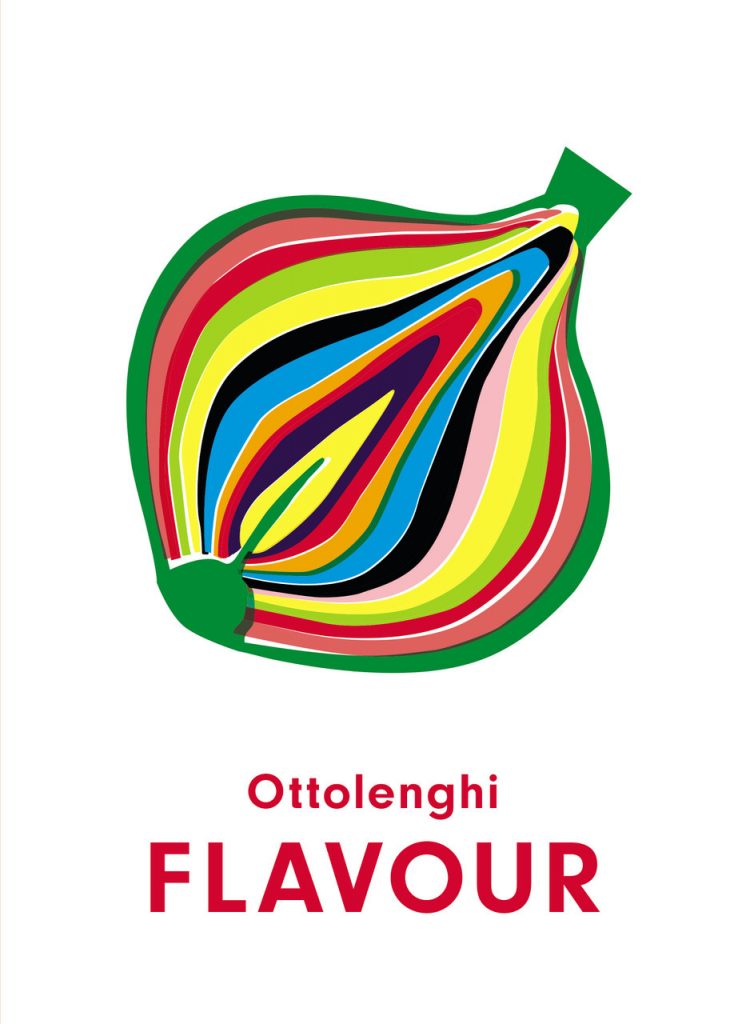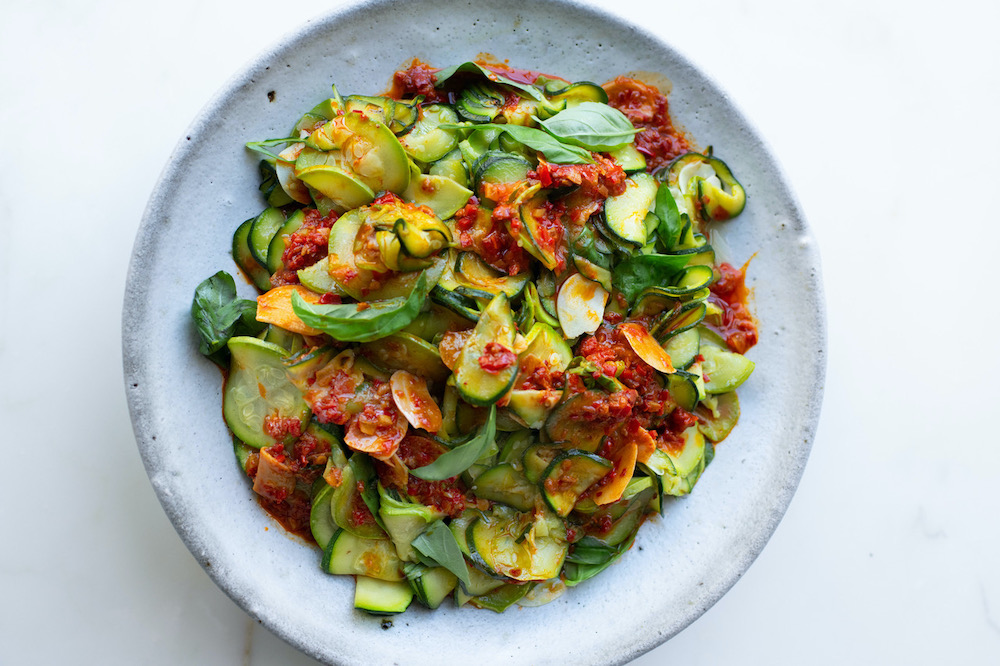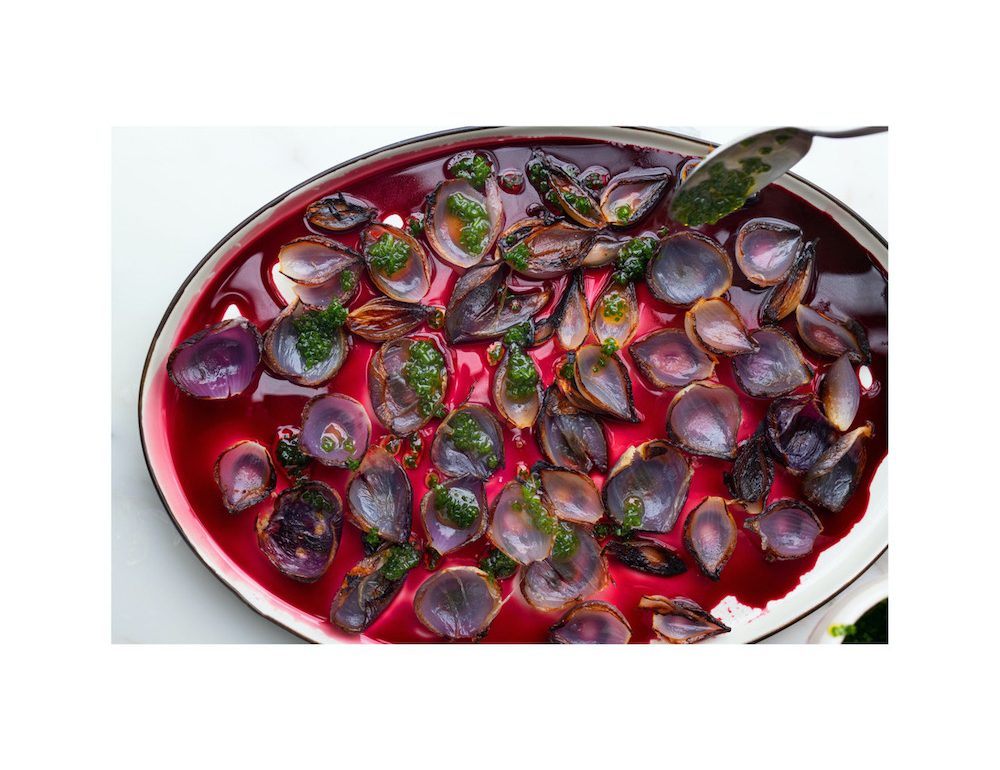Do Yourself a Favour with Flavour – I’ve always been a great fan of Yotam Ottolenghi and have most of his books. This week sees the publication of his latest – Ottolenghi FLAVOUR – written in conjunction with Ixta Belfrage, who has worked with Ottolenghi for many years in London. Yotam’s commitment to championing vegetables, as well as many ingredients once perceived as ‘exotic’, has led to what some refer to as ‘The Ottolenghi Effect’. Well, in my book this is shorthand for creating delicious food using products that are now widely available, such as zatar, sumac, pomegranate molasses and pul biber (A traditional Turkish condiment of salted and oiled flakes of dried red pepper which I always brought home from trips to Turkey, but now I can buy in Waitrose)
The book is a vegetarian’s delight. But, not personally being vegetarian, I find it equally fabulous, and it will inspire anyone to be more creative with these flavour-packed vegetable recipes, many of which make a great accompaniment to a meat dish too. The book explores the three principles that create great flavour and offers innovative veggie dishes that deliver new ingredient combinations and techniques that – even on browsing through the pages – will excite and inspire you to try them. It’s broken down into three sections: Process, which explains the best cooking methods; Pairing, identifying four basic pairings that are fundamental to great flavour and Produce, offering impactful veg that do the work for you.
I’ve already tried a couple of recipes from the book and thought you might like to try one or two of these to whet your appetite. The courgette recipe will be perfect for anyone with a glut of courgettes in the garden at the moment and it is really easy and fabulous!

Sweet and Sour Onion Petals (Serves 4 as a starter or part of a mezze spread)
“These onions – sweet inside, charred at the edges and swimming in a tart pomegranate syrup – started their life at Testi, a north London Turkish restaurant that we love, where a similar dish is made by charring onions next to lamb on the grill, then tossing them in şalgam, a juice made from the soursalty brine of fermented purple carrots and turnips, and finally sweetening them with pomegranate molasses. The bitter-sweet onions are served alongside the meat, cutting through its fattiness like a sharp knife.
Our onions are made with reduced pomegranate juice instead of molasses and şalgam. They would obviously sit well alongside grilled meats, but we find them totally delicious also in a vegetarian context, with or without the goat’s cheese, which is optional. They will go really well with hummus, for example an aubergine salad and some bread.”
500g golf-ball-sized red onions (about 12), peeled, then halved lengthways
75ml olive oil
400ml pomegranate juice (100% pure)
10g chives, finely chopped
70g young and creamy rindless goat’s cheese, broken into 2cm pieces (optional)
2⁄3 tsp Urfa chilli flakes (or another variety of chilli flake if you can’t get them)
salt
1. Preheat the oven to 200 deg C fan.
2. Heat a large non-stick frying pan on a high heat until very hot. Toss the onions with 2 tablespoons of oil and teaspoon of salt and place them, cut side down and spread apart, in the hot pan. Place a saucepan on top to weigh the onions down and create an even char, then turn the heat down to medium-high and cook, undisturbed, for about 6 minutes, or until the cut sides are deeply charred. Transfer the onions to a parchment-lined baking tray, charred side up, and bake for about 20 minutes, or until softened. If your onions are larger than golf-ball size, this may take longer. Set aside to cool.
3. Meanwhile, put the pomegranate juice into a medium saucepan on a medium-high heat. Bring to the boil, then simmer for about 12 minutes, or until the liquid has reduced to about 70ml and is the consistency of a loose maple syrup. Set aside to cool; it will thicken as it sits.
4. Combine the chives with the remaining 45ml of oil and a good pinch of salt and set aside.
5. Pour the pomegranate syrup on to a large platter with a lip and swirl it around to cover most of the plate. Use your hands to loosely separate the onions into individual petals, then place them haphazardly over the syrup. Dot over the goat’s cheese, if using, spoon over the chive oil, and finish with the Urfa chilli flakes.

Super-Soft Courgettes with Harissa and Lemon (serves four as a side or mezze)
“Courgettes aren’t strictly speaking controversial, but they do tend to get a pretty lukewarm reaction from many, including, regrettably, two of our test kitchen colleagues. The reason for this is probably courgettes’ high water content, which tends to make them, well, watery. There are plenty of ways to combat this – frying and grilling are two examples – but we actually use it to our advantage here, cooking the courgettes slowly in their own juices, making them fantastically soft and enhancing their flavour by a long soak with fried garlic. (And in the process, we also managed to win over our two courgette-iffy colleagues, we’re happy to announce.)
The courgettes are very good hot, but are even better after 15 minutes or so, or even at room temperature, once the flavours have had a chance to get to know each other. Make them a day in advance, if you want to get ahead; just hold off on adding the basil until you’re ready to serve. “
85ml olive oil
6 garlic cloves, finely sliced
1 tbsp rose harissa (adjust according to the brand you are using)
1 red chilli, finely chopped
½ preserved lemon, finely chopped, discarding any pips (10g)
1½ tbsp lemon juice
1kg courgettes, finely sliced
10g basil leaves, roughly torn
salt
1. Place a large, non-stick sauté pan on a medium-high heat with the oil and garlic. Gently fry for 4 minutes, stirring often, until soft, golden and aromatic. You don’t want the garlic to become at all browned or crispy, so turn the heat down if necessary. Remove 3 tablespoons of oil, along with
half the garlic, and transfer to a small bowl with the harissa, chilli, preserved lemon and lemon juice. Stir together and set aside.
2. Return the pan to a high heat and add the courgettes and 1¼ Teaspoons of salt. Cook for 18 minutes, stirring often, until the courgettes are very soft, but are still mostly holding their shape (you don’t want the courgettes to brown, so turn the heat down if necessary). Stir through half the basil and transfer to a platter. Spoon the harissa mixture over the courgettes. Leave to sit for 15 minutes, then sprinkle with a pinch of salt and finish with the remaining basil.
Extracted from Ottolenghi FLAVOUR by Yotam Ottolenghi and Ixta Belfrage (Ebury Press, £27). Photographs by Jonathan Lovekin
The Seasoned Gastronome


